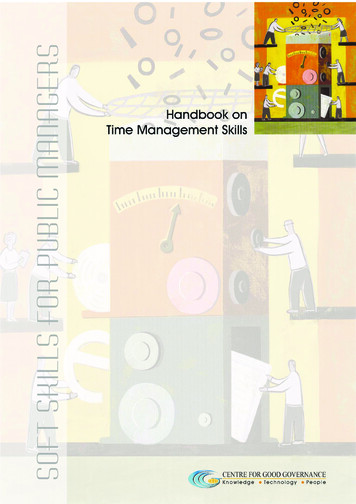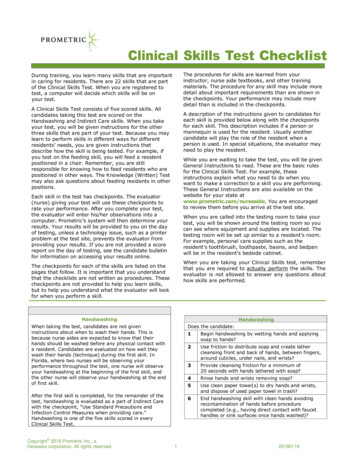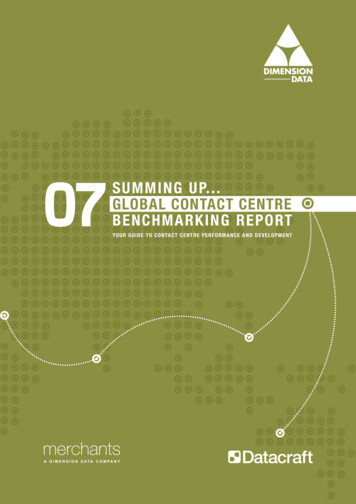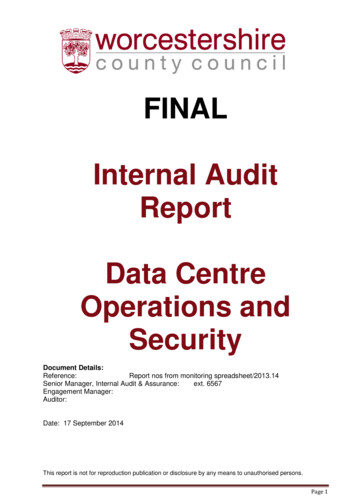
Transcription
Handbook on Time Management Skills
Purpose of this HandbookThe Handbooks Soft Skills developed by Centre for GoodGovernance are intended primarily for personnel in publicadministration. They offer an overview of some of the principalskills that are essential for effective performance.They draw heavily upon existing literature and current practicesin public and private organizations around the world andinclude numerous references and links to useful webresources.They are not comprehensive ‘guides’ or ‘how to’ booklets.Rather, they incorporate the perspectives of experts in thespecific domains whose knowledge, insights, advice andexperiences prove handy in honing skills essential forstrengthening the capacity for effectiveness of public serviceat all levels of government.This handbook, Time Management Skills, focuses on howthe personnel in the public administration can developapproaches and strategies that will enable them to effectivelydeal with time management problems in a variety of contexts.
TABLE OF CONTENTSPageNo1.Introduction - Understanding Time Management12.Misconceptions of Time23.Symptoms of Poor Time Management34.The Eleven Time Thieves45.Saboteur Time Styles76.Monochronic and Polychronic Views of Time107.The ‘Five Time Zone’ Concept138.Time Management Matrix159.Elements of Effective Time Management1910.Getting Oriented to Manage Time4111.Overcoming Barriers to Effective Time Management43
Handbook on Time Management Skills1 IntroductionUnderstanding Time Management“We all have time to either spend or waste and it is our decision what to do with it.But once passed, it is gone forever.”- Bruce Lee (“Zen in the Martial Arts” by Joe Hyams)Every individual on earth has the same amount of time - 60 seconds in a minute; 60minutes in an hour; 1,440 minutes in a day; and 525,600 minutes in a year. While avast majority of people confesses faltering to come to grips with it, extremely few canclaim to have made the most of it. How is it that they have got it all done? It’s becausethey have managed a way to figure out how to manage their time effectively.Time Management is more than just managing time. It is about controlling the use ofthe most valuable - and undervalued - resource. It is managing oneself in relation totime. It is setting priorities and taking charge of the situation and time utilization. Itmeans changing those habits or activities that cause waste of time. It is being willingto adopt habits and methods to make maximum use of time.With good time management skills one is in control of one’s time, stress and energylevels. One can maintain balance between one’s work and personal life. One findsenough flexibility to respond to surprises or new opportunities. It is not how much timeone has, but rather the way one uses it. The bottom line is how well one manages time.Internationally known authority on time management Dr. Alec Mackenzie in his bookThe Time Trap argues that the very idea of time management is a misnomer becauseone really cannot manage time in the way other resources can be managed: financialcapital, physical capital, human capital, information and time. While each of the firstfour can be augmented, reduced, transferred or otherwise controlled, Time cannot bemanipulated. Dr. Mackenzie contends that when it comes to time, one can only manageoneself in relation to it. One cannot control time as one can control other resources –one can only control how one uses it. In the world in which we live, time cannot bereplaced or re-created. It is therefore not for us to choose whether we spend or savetime but to choose only how we spend it.1
Soft Skills for Public Managers2 Misconceptions about TimeThere are several misconceptions which we all have about time. They affect everyoneincluding those persons who may be considered quite successful and effective. Here aresome of the misconceptions identified by Dr. Mackenzie:· Time management is simple - all it requires is common sense. While it is truethat the concept is simple, the self-discipline required to practice effective timemanagement is not easy.· Work is best performed under pressure. Psychological studies show this to beno more than an excuse for procrastination. One does not work well under pressure- only does the best one can under the circumstances. Pressure and challengemust not be confused. Lara’s performance when the West Indies Team is in troublehas more to do with application and determination rather than pressure.· I use a diary, a to-do list and have a secretary to keep me organized. Onehas to keep oneself organized - no one can do it for others. The trouble with thedisorganized person is that he hardly has time to listen to his secretary or look athis diary.· I do not have the time. The effective worker or manager often gets more workdone in the earlier hours of the morning than most laggards get done in the wholeday. He then no longer has to work against tight deadlines and under stress whichcontributes to heart problems and not unusually the ultimate reduction of time onthis earth.· Time management might be good for some kinds of work but my job iscreative. Time management is not about routine: it is about self-discipline. Lack ofdiscipline prevents one from being great instead of simply good.· Time management takes away the fun and freedom of spontaneity. Is workingunder stress, forgetting appointments, making constant excuses and apologies tobe fun? Would it not be much more fun if by better organization one had one or twomore hours every day to spend with the family, to play games, read a good book,plan for tomorrow and the day and week after or just relax?2
Handbook on Time Management Skills3 Symptoms of Poor Time ManagementPoor time management shows up by way of one or a combination of typical perceptiblesymptoms. Managers would do well to look for and reflect on whether they are subject toany of those symptoms with a view to take necessary corrective actions.The following are some of the indicators of poor time management:· Constant rushing (e.g. between meetings or tasks)· Frequent delays (e.g. in attending meetings, meeting deadlines)· Low productivity, energy and motivation (e.g. ‘I can’t seem to get worked upabout anything’)· Frustration (e.g. ‘Oh, things just don’t move ahead)· Impatience (e.g. ‘where the hell is that information I’ve asked him for?’)· Chronic vacillation between alternatives (e.g. ‘whichever option I choose it isgoing to put me at a big disadvantage. I don’t know which way to jump’)· Difficulty setting and achieving goals (e.g. ‘I’m not sure what is expected of me’)Why do/will I have so little time ? Management by crisis Paperwork Lack of Planning Poor communication Incomplete information Poorly organized meetings Personal disorganization Leaving tasks unfinished Attempting too much Inadequate controls Inability to Say No Lack of self-discipline Responsibility unclear Socializing Ineffective delegation Drop-in visitors Inadequate staff & resources Telephone interruptions3
Soft Skills for Public Managers4 The Eleven Time ThievesDr. Donald E. Wetmore ( “Time Thieves: The 11 Biggest Time-wasters Revealed”) lists outthe eleven ‘inconsiderate troupe’ of eleven thieves that gang up to steal some of the precioustime away from productive use of managers.1. Poor Planning: Failure to see the value of planning and getting impatient to getsomething done are the causes of poor planning. Absence of a plan of action is likely totrigger off a false start, resulting in unproductive time utilization on the critical path of thetask being undertaken. Consequently, the managers might not find enough time forcompleting the task.2. Crisis Management: Most often, crisis management is an offspring of lack ofprioritization of tasks. As a result of the inability to distinguish between the urgent, theimportant and the unnecessary tasks, unimportant tasks are likely to get done first at thecost of important tasks. Consequently, the managers are not likely to find enough time toget around to the important things.3. Procrastination: It is easy to put off tasks if they are not due right away. The trouble is,tasks pile up and can force managers to run into a time crunch later. Procrastination isgenerally triggered off by the fear of failure / success, perfectionism, wanting to do it all orincorrect priorities. It is a virtue to want to do a good job. But some people become soanxious about getting a job done perfectly that they never complete it. Managers shouldexamine whether their efforts to get the job done perfectly are really improving things orpreventing them from getting the job done.4. Interruptions: Interruptions and distractions arise due to lack of planning, poorconcentration and lack of control over environment. They are unnecessary thieves of amanager’s time and come in many forms – drop-in visitors, telephones, e-mailsunscheduled meetings, poor communications and confused chain of authority etc. Managersshould be less willing to automatically give away their time just because they demand it.They should learn to avoid distractions if they are to get work done. They should work inareas where they are less likely to be disturbed and tell people when they are busy andcannot be disturbed.4
Handbook on Time Management Skills5. Not Delegating: Wanting-to-do-all by oneself is yet another thief that could let themanagers lose control. They feel that employees can never do anything as well as theycan. They fear that something will go wrong if someone else takes over a job. They lacktime for long-range planning because they are bogged down in day-to-day operations.6. Unnecessary Meetings: If a meeting is held without a specific agenda and nothingproductive comes out of it, clearly that meeting was unnecessary. Obviously, such meetingsare thieves as the time is wasted and things just do not get started.7. The “shuffling blues”: Managers often waste much time because of disorganization.Keeping things that they need in a specific place, eliminating clutter, making sure that theyhave all the materials or information that they need before starting on the task and followinga day-planner or schedule will help keep the ‘shuffling blues’ away at the work place.8. Poor Physical Setup: Not having the things that the managers need frequently withineasy reach and having a lot of the things that they seldom require close-by results in wastageof a lot of time, wearing out the carpet, retrieving what they frequently need. And of course,as they pass others they will often pull them aside to steal some of their time.9. Poor Networking: Quality relationships with employees and others can be a substantialtime-saver as they open doors for the managers with all kinds of opportunities. Failing todevelop a good network base will cause them to waste time creating what they might havehad through their network.10. Bad Attitude: Nothing sinks a day more effectively than having a poor attitude. Itcauses the managers to dwell on the problems and not the solutions and makes it possibleto throw the day away. When they are burdening others with their problems and complaintsthey are forfeiting their valuable time.11. Negative People: Being surrounded by negative people could mean the managersare spending a lot of their time listening to them but getting nothing much or purposefulfrom them. Obviously, avoiding such people will help the managers to minimize wastedhours and get some of their productive time back.5
Soft Skills for Public ManagersHow much time do your spend each day on the following time stealers?6 Watching TV Reading Newspapers / Magazines excessively Idle chat, gossip and telephonic talk Opening and sorting mail Returning telephone calls Meetings Paying bills Day-dreaming Fretting over personal problems Caught in traffic snarls Planning how to change things Waiting for things to happen Taking naps Eating snacks between meals Drinking Smoking Shopping Wagering money
Handbook on Time Management Skills5 Saboteur Time StylesThe other aspect is self-inflicted thieves – ‘saboteur time styles’ that steal time. Basedon the typical patterns of behaviour that tend to sabotage people’s attempts at effectivetime management, Susan Ward (“Are You Sabotaging Your Time Management Efforts”)classifies managers into different personality types and prescribes the following simpleexercise, intended to help managers discover their standard behavioural responsesto events and provide them with some clues for effective time management.The Firemen - For them, every event is a crisis. They are always seen busy dousingthe fires. They find scarcely any time for anything else and do not spare a thought ontime-management. Tasks keep piling up around them, while they are seen rushingfrom fire to fire all day.The Over-Committers – They just cannot say ‘No’ to anybody. They oblige and try toplease everybody. All that anyone has to do is just ask, and they will chair anothercommittee, take on another project, or organize yet another community event.Consequently, none of the tasks receives complete attention and remains half-done.The Aquarians - There is such a thing as being too “laid-back” - especially when itstarts interfering with their ability to finish tasks or bother to return phone calls. Gettingto things that is when they get to them is not time management; it is simple taskavoidance.The Chatty Kathys - Born to socialize, they have astounding oral communicationskills and cannot resist exercising them at every opportunity. Every interaction becomesa long drawn out conversation - especially if there is an unpleasant task dawning thatthey would like to put off.The Perfectionists – Exactitude is their watchword, and they feel that no rushed jobcan be a good job. Finishing tasks to satisfaction is such a problem; they need moretime zones, not just more time.7
Soft Skills for Public ManagersPrice of Time InefficiencyWhat is the price of inefficient time management for an organization? That is a crucialquestion managers should ask and promptly address. Statistics show that a person on the average - loses at least one hour of productivity each day due to disorganizationand inefficiency. Accordingly calculated, the aggregate monetary value of loss causedby inefficient time management by all the employees in an organization amounts to:· 1 hour X one person’s hourly salary Rs.· 6 days a week X Rs. lost today Rs. lost this week.· 48 weeks X Rs lost this week Rs. lost this year.· Number of persons X Rs. lost this year Rs (total)The Six D’s“When’s the last day you didn’t have a high-priority phone call, an urgent email or astressed-out colleague begging for attention?” asks Tom Gegax, founder of GegaxManagement Systems and author of the best –seller “By the Seat of Your Pants:The No-Nonsense Business Management Guide. “He says: “Getting pulled off-course is in every leader’s job description. That’s whyenlightened managers must have a strategy for dealing with daily interruptions.”Gegax bases his time-management principles on the “Six D’s” - don’t do it, delayit, deflect it, delegate it, do it imperfectly and do it.“When something pops up, rather than robotically just doing it, I start with the firstoption,” Gegax says. “If that doesn’t apply, I move on to the second. I keep cruisingdown the list until I reach the appropriate action.”For instance, many seemingly urgent tasks disappear if you don’t do them or delaythem, he says, leaving you more time and energy to focus on the tasks that matter.And while some contingencies need immediate attention, your involvement isn’talways required. Carefully consider whether to deflect the situation to anotherdepartment or delegate it to a subordinate, Gegax advises.8
Handbook on Time Management SkillsIf you do opt to tackle the problem yourself, Gegax cautions against automaticallyshifting into “perfectionist mode.”“A large number of my projects could hardly be described as perfect, yet weresuccessful nevertheless,” he says.Of course, reserve the final “D” — do it — for the tasks you’ve determined will keepyou moving toward your goals.(Matt Krumrie - Time Management for Managers)An easy way to find out how effectively or ineffectively managers spend their time is touse the Time Inventory Chart. At the end of each day they should write down the timespent on each of their activities. The total amount of time for all activities should equalthe total number of hours they were awake.TIME INVENTORY s AwakeWork: Office &HomeCommuting &TravelEatingDressing &PersonalHygieneFamily &PersonalWorkEducation &Self-ImprovementCommunity &ProfessionalActivitiesLeisureHours unaccounted for 9
Soft Skills for Public Managers6 Monochronic and Polychronic Views of TimeJust as a person’s overall personality is made up of and represented by his or hertraits, a person’s time personality is made up of a series of time styles – monochronicor polychronic. It is expected that a person’s awareness of the monochronic/polychronicside of personal time style affects his or her overall approach to time use, perceptionsof time pressure and the amounts and order of time spent on tasks. This, in turn,affects his or her personal efficiency.Monochronic approach to time management is essentially objective and lays emphasis on promptness, speed, brevity and punctuality. It is a very efficient and focusedway to manage work and life. Monochronic time managers are those who thrive ondetailed planning and organization. They prefer to focus on one task at a time and theyfollow a schedule from which they don’t like to deviate. They tend to get upset by distractions or interruptions and are inclined to put new tasks off until a later date, whenthey can be worked into the schedule.Polychronic approach to time management is subjective and lays emphasis oninspiration, imagination, flexibility, intuition and dedication. Trust, bonding, pleasureand quality of life influence more strongly the decisions of a person who ‘ticks’ inpolychronic time. Polychronic time managers prefer to have many projects under waysimultaneously, enjoy changing from activity to activity and are unflustered bydistractions and interruptions. Unlike their monochronic counterparts, polychronicmanagers believe they perform well under pressure.Monochronic Managersdo one thing at a timeconcentrate welltake time seriouslylow context, need informationare committed to the jobadhere religiously to plansare concerned with not disturbingseldom borrow or lendemphasize promptnessare accustomed to short-term relationships10Polychronic Managersdo many things at onceare highly distractible and subject tointerruptionsconsider time commitments andobjective to be achieved, if possiblehigh context, have informationare committed to the peoplechange plans often and easilyare more concerned withothers closeness than privacyborrow and lend easilybase promptness on the relationshipstrong tendency to build lifetime relationships
Handbook on Time Management SkillsClearly, monochronic approach is better suited for dealing with routine and predictabletasks, while polychronic approach is better suited in dealing with things such as creating anew concept or resolving an argument. Conflict arises when managers apply a monchronicstyle to a situation that demands polychronic time, or managers prefer polychronic stylewhile the situation warrants the use of monchronic style.So how do the managers cope with a healthy need for subjective, polychronic, self-imposedtime and at the same time fit in with the monochronic and objective time measures? Theonly way managers can figure out which method works best in a given situation is basedon sound reasoning and acumen.How can you get an extra hour out of each day?Here are some tips to help you squeeze those extra minutes out of your day. Of course,you can adapt these so that they will fit in with your situation.1. Get up earlier2. Watch less TV (I mean how many Law & Order spinoffs does one need towatch?)3. Avoid allowing others to waste your time4. If you don’t have to drive to work, use that time to study or plan. If you dodrive to work listen to a motivational tape on the way to work instead ofthat mindless dj talk.5. Organize your work; do it systematically.6. Make creative use of lunchtime.7. Delegate authority if, possible.8. Spend less time on unimportant phone calls.9. Think first, and then do the task.10. Do what you dream about doing, instead of just dreaming about it.11. Work hardest when you’re the most mentally alert12. Eliminate activities that make the smallest contributions to your life.13. Always do the toughest jobs first.14. Before each major act ask, “Is this really necessary?”15. Choose interesting and constructive literature for spare time reading.16. Learn how to sleep. Sleep soundly, then work refreshed.11
Soft Skills for Public Managers17. Skip desserts.18. Stop smoking.19. Write notes or letters while waiting for others.20. Always carry an envelope with paper in it and a few stamps.21. Combine tasks that are done in the same area.22. Be prompt for all appointments.23. Lay out your clothes the night before.(I need to remember this myself)24. Call on specialists to do work that you cannot do efficiently25. Learn to read more rapidly.26. Take a nap after dinner. Then take a shower. Begin the evening hoursrelaxed and refreshed.27. Avoid interruptions.28. Avoid making a big production out of tiny tasks.29. Search out job shortcuts.30. Know your limitations.31. Work to your full capacity. I know it’s tough to break bad habits. However,it is necessary to make sacrifices so that your business can be successful.Don’t try to implement all of these ideas at once. Implement them one at a time andrepeat them until they become a part of your daily routine.Source: http://EzineArticles.com/?expert DeAnna Spencer12
Handbook on Time Management Skills7 The ‘Five Time Zone’ ConceptTo accelerate the ability to manage their time, managers need to strike a proper balancebetween monochronic and polychronic aspects of time management. The ‘Five TimeZone Concept’ advocated by Lewis, Justus and Storz, Moni Laui (Switch on Your Mind:Accelerative Learning Strategies at Work.) enables managers to bring about that balance.The five links in the ‘Five Time Zone’ approach are - vision, plans, personal organisationsystems, commitment and energy. Developing Zone 1 - Vision and Goals: Managers must search for visions, nottasks. These visions are guided by their personal standards and values, and thedirection they want to take. Once their visions are crystallized, they need to dosome thinking to create goals from their visions and action steps from their goals.My vision and goals . . . What is most important to me? What would I like to do if there were no limitations? What things in my life would I like to be different? My visions for myself are . . . Developing Zone 2 - Plans: Having established goals, managers now can moveinto zone two - plans. A plan is needed to turn visions and goals into action. Writingthings down and using some form of planning ‘tool’ are keys to successful planning.Once they have drawn up the plan, they need to review it. They should plan for highpayoff and low-payoff activities for high and low priorities. Developing Zone 3 – Personal Organization Systems (POS): Zone threeencompasses a manager’s personal organisation system. Organising the desk,follow-up, paperwork, physical environment are all part of personal organizationsystem. The personal organization system should focus on – Creating an interesting and relaxing work-space Providing easy access to basic tools and materials Grouping similar tasks together to optimize time13
Soft Skills for Public Managers Devising a good follow-up system that works wellEnabling efficient handling of each piece of paperEnsuring a wider reach of peopleMy action plan to develop my POS12345 Developing Zone 4 – Commitment: The fourth time zone is the zone ofcommitment, in which managers correct any tendencies they might have towardsprocrastination. Procrastination can be overcome by identifying why one isprocrastinating, breaking the mental blocks and visualizing the successful completionof a task while in a relaxed state. One way to do this it to identify the real reason forthe procrastination - personal, logical, emotional or ethical barrier to action. Oncethis has surfaced from the subconscious to the conscious, strategies can be broughtinto play to deal with it.Reasons why I procrastinate . . .12345 Developing Zone 5 – Energy: The final factor that keeps the chain together iszone five, the energy zone. Managers must check their office surroundings, as theenvironment they work in can sap or strengthen their energy levels. They must alsoidentify the prime time - the time of day when they are most energetic and alert –they can schedule high-priority, high-payoff tasks or activities for these times.14 Find your prime time Internal and external prime time Cognitive tasks for the morning Complete high-energy tasks in high-energy periods Take energy breaks
Handbook on Time Management Skills8 Time Management MatrixTime management experts like Stephen Covey S R (The Seven Habits of Highly EffectivePeople; Simon & Schuster) have developed a model called a time management matrix.This model enables managers to prioritize their activities and use their time more effectively.With the help of the model, they can evaluate their activities in terms of importance andurgency.Time Management matrixUrgentNot UrgentQuadrant IQuadrant IICrises, Projects,Planning, exercise,relationships, etc.Quadrant IIIQuadrant IVImportant accidents, etc.Phone calls, visitors, Daydreaming, TV,Notprocrastination, etc.Important small talk, etc.Tasks can be categorized as urgent/ not urgent or as important/ not important as shownbelow. Each of a manager’s activities can be distinguished as one of four types,represented by the four quadrants of the time management matrix. Categorizing amanager’s activities in these quadrants helps him identify what is important and avoidunimportant tasks and activities. It also helps him prioritize important tasks and activities.15
Soft Skills for Public ManagersQ1 : Sruggling to stay aheadUrgentNot UrgentQuadrant IQuadrant IIQuadrant IIIQuadrant IVImportantNotImportantThe activities in Quadrant 1 are both important and urgent. These include deadline-driven tasksand important daily chores. The results of operating in this Quadrant are stress, burnout andcrisis managementQ2 : Calm and in controlUrgentNot UrgentQuadrant I Quadrant IIImportantNotImportant16Quadrant III Quadrant IV
Handbook on Time Management SkillsThe activities in Quadrant 2 are important but not urgent. These activities are characterizedas preparation, planning, crisis prevention, and deadline-avoiding tasks. Operating in thisQuadrant will mean a manager having a proper perspective, vision, balance, discipline,control and few crises.Q3 : Busy going nowhereUrgentNot UrgentQuadrant IQuadrant IIQuadrant IIIQuadrant IVImportantNotImportantThe activities in Quadrant 3 are not important but urgently press upon us and interrupt our moreimportant activities. These include responding to drop-in visitors, phone calls, meetings, andmail that do not increase productivity and effectiveness. Operating in this Quadrant will meanshort-term focus, crisis management, worthlessness of goals and plans, feeling of victimization and broken relationships.17
Soft Skills for Public ManagersQ4 : Aspiring to mediocrityUrgentImportantNot UrgentQuadrant IQuadrant IIQuadrant IIIQuadrant IVNotImportantThe activities in Quadrant 4 are neither important nor urgent. Busywork, time wasters, junkmail, and some phone calls are the type of activities that are a part of this quadrant.Operating in this Quadrant will mean total irresponsibility and over-dependence on othersin addition to outcomes in Quadrant 3.From a study of the Time Management Matrix, the following observations can be made:1. Activities in Quadrant I and Quadrant II may be equally important. Some activities inQuadrant II may even be more important than activities in Quadrant I, but notnecessarily more urgent.2. Activities in Quadrant I assume critical importance and top priority.3. Spending most of the time on Activities in Quadrant I results in stress and burnout.4. Focusing on activities in Quadrant II can reduce the activities in Quadrant I, in the longrun.5. Focusing on activities in Quadrant II will mean avoiding all unimportant activities inQuadrant III and IV.18
Handbook on Time Management Skills9Elements of Effective Time ManagementTime goes by at the same rate no matter what one does. One can not speed it up or slowit down. Unlike the other resources that one manages, there is no way to control time. Thebest one can do is take charge of oneself in the framework of time, investing oneself inthose things that matter most in one’s life.Effective time management requires reducing the impact of the time stealers and increasingthe effectiveness of a manager in getting the things done that need to be done. The followingare the important elements that combine to enable a manager eliminate distractions,interruptions and inefficiencies in the work process to make the most of time management.A. Evaluating How Time is UsedThe first step of effective time management is identifying how a manager is using his time.This can be done by –I. Activity Time Log: The first step to managing time better is to find out how managersare currently spending their time. Keeping a Time Log is a very effective way to do this.Through an Activity Time Log, managers can make a list of the activities or tasks that theyspend time on. The very act of measuring is often enough to raise their unconscious habitsinto their consci
1. Introduction - Understanding Time Management 1 2. Misconceptions of Time 2 3. Symptoms of Poor Time Management 3 4. The Eleven Time Thieves 4 5. Saboteur Time Styles 7 6. Monochronic and Polychronic Views of Time 10 7. The ‘Five Time Zone’ Concept 13 8. Time Management Matrix 15 9. Elements of Effe










